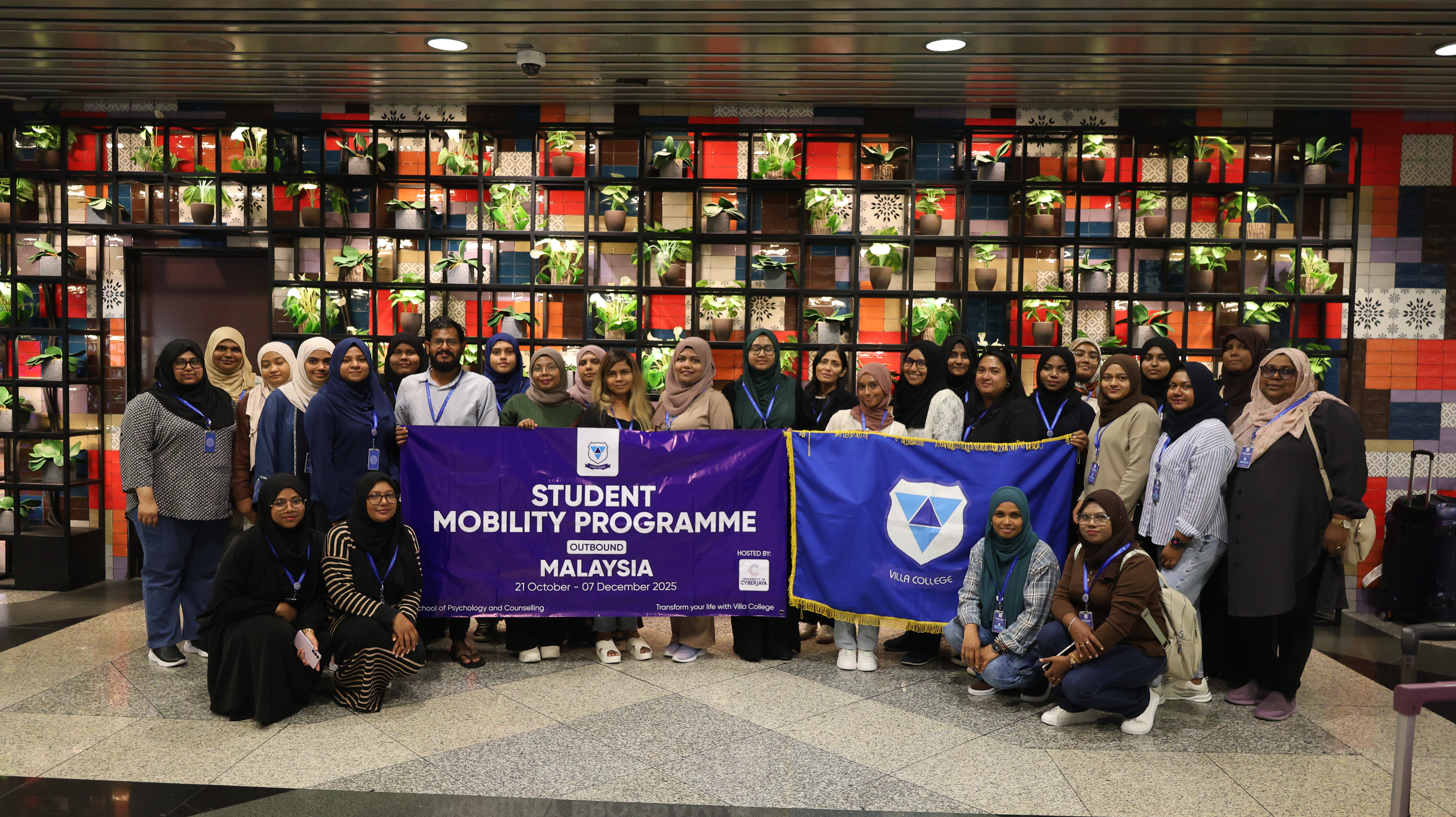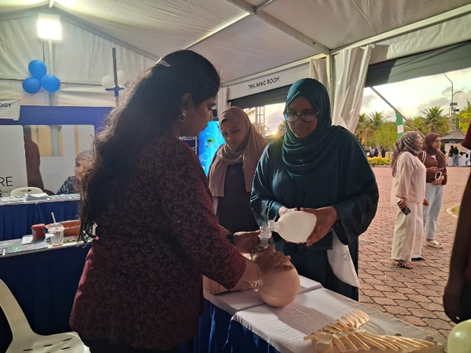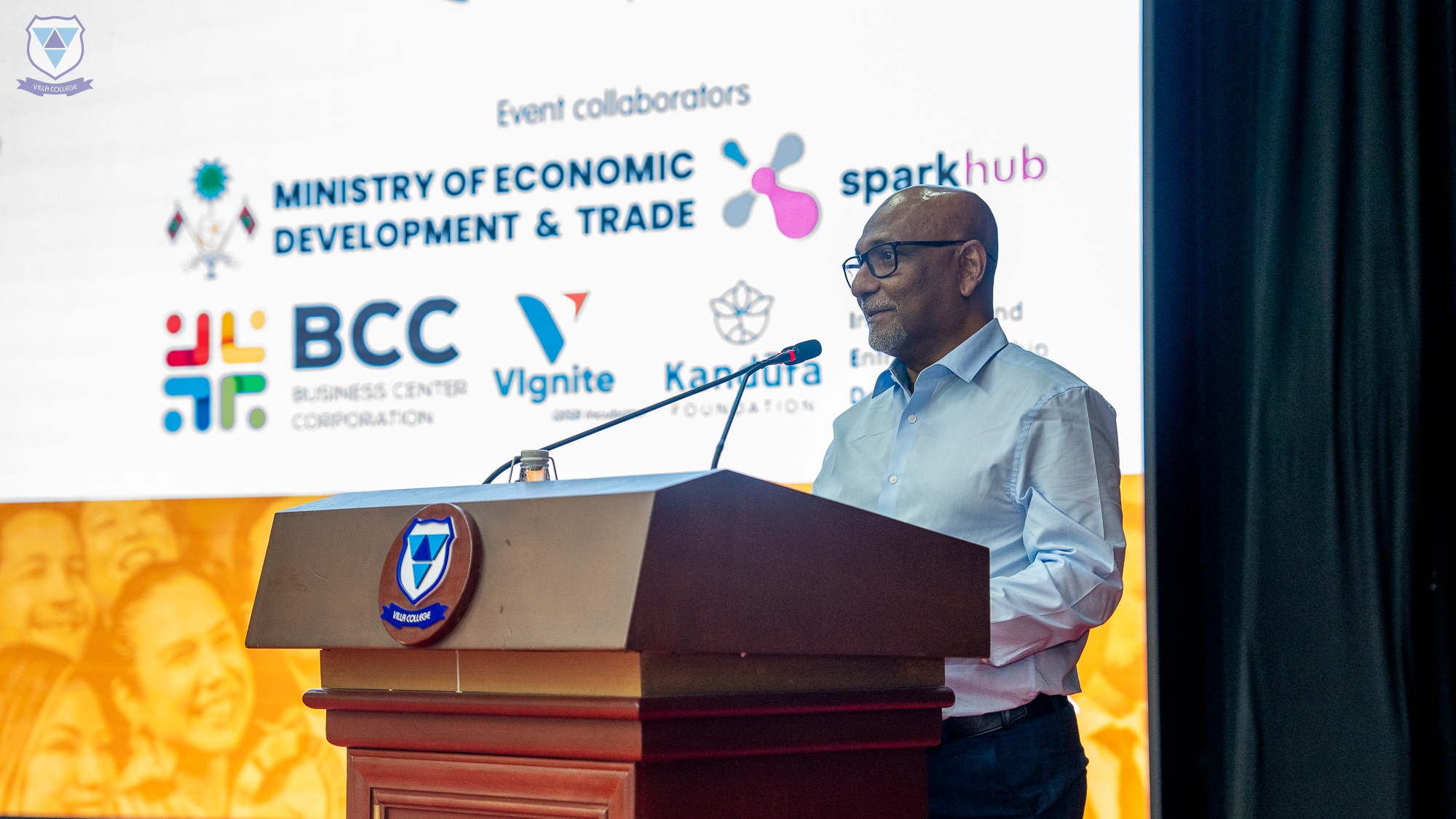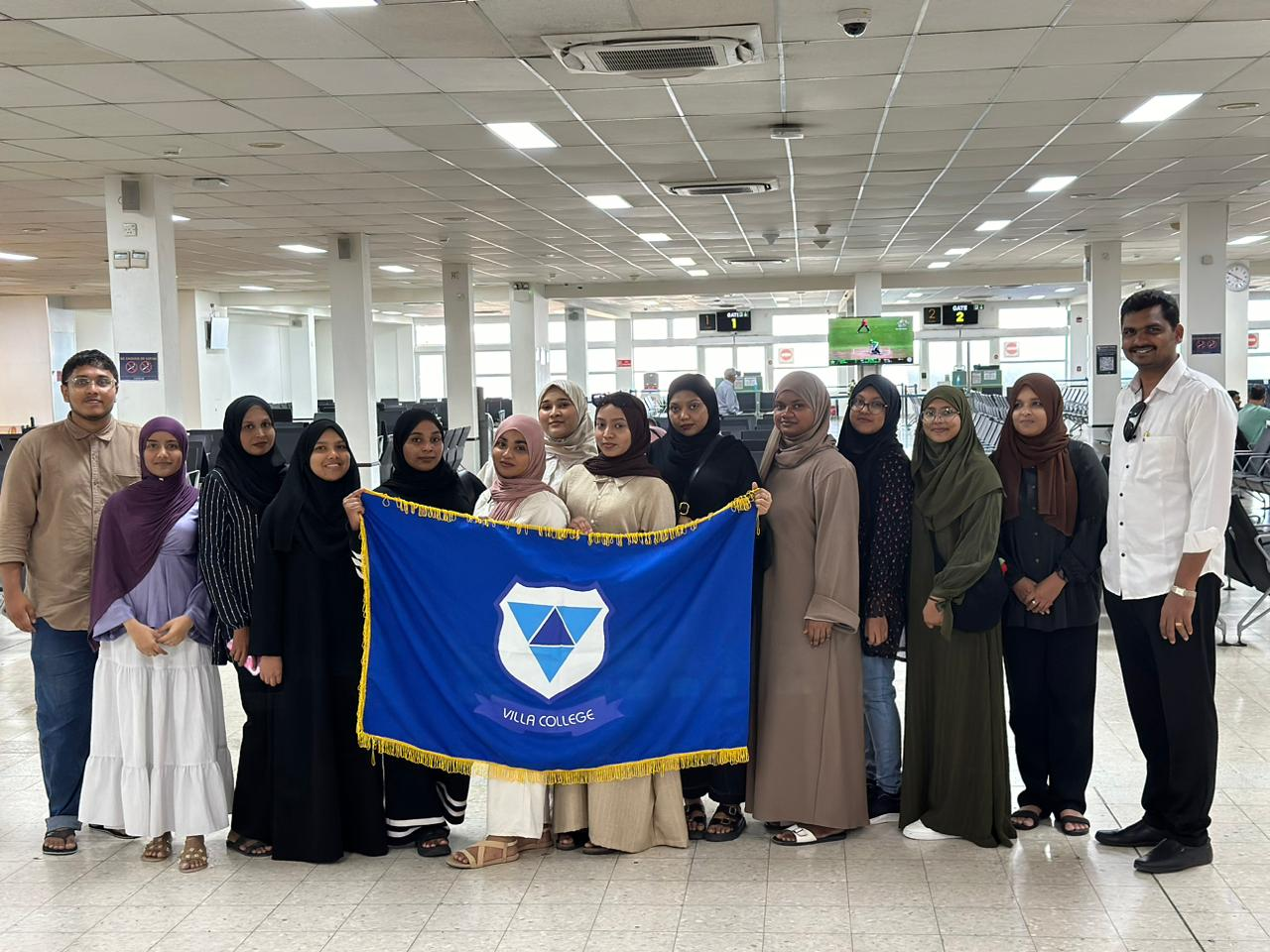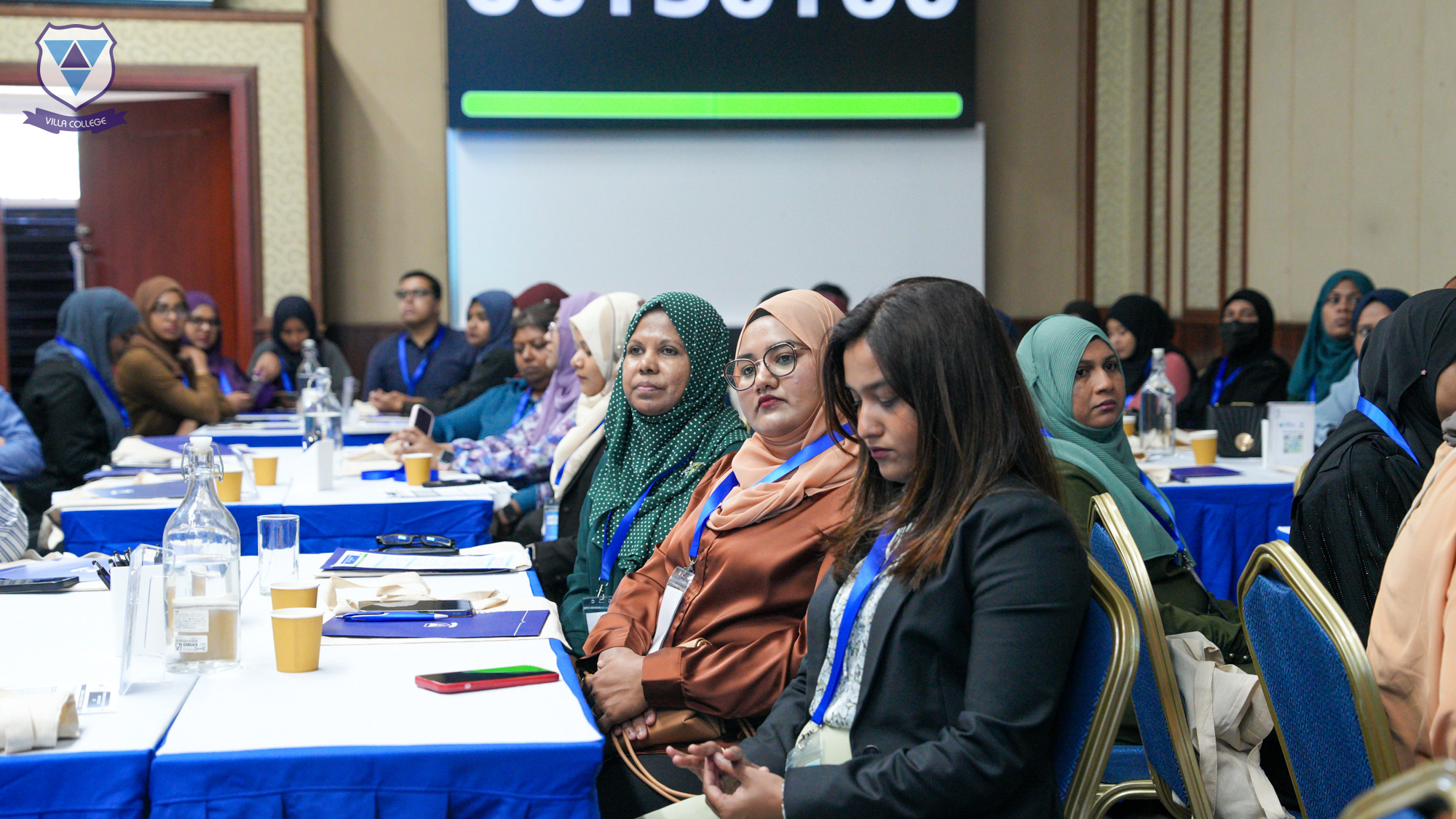ÃÜÌÒÊÓƵ's inaugural International Medical Education and Research Conference (IMERC 2025) concluded last week, marking a transformative milestone in the Maldives' healthcare landscape.
ÃÜÌÒÊÓƵ played a pivotal role in orchestrating this landmark event, with faculty and students working alongside international experts to deliver comprehensive educational experiences that bridged cutting-edge research with practical clinical application. This historic collaboration between Mayo Clinic, Indira Gandhi Memorial Hospital, and Tree Top Hospital brought world-class medical expertise directly to island communities, embodying the conference's powerful theme of "Global Knowledge, Local Impact."
The conference represented more than an academic gathering; it signalled a fundamental shift in how medical education and research can be approached in island nations, demonstrating that geographical remoteness need not limit access to world-leading healthcare expertise.
IMERC officially began with pre-conference workshops held in Maafushi, delivered in collaboration with the Secretariat of the Maafushi Council, ÃÜÌÒÊÓƵ, and IMERC partners. This community-focused approach set a powerful tone of dedication, innovation, and compassion in healthcare from the very first day. The outreach sessions included dive medicine updates for dive teams led by Dr. Jay Adusumalli, public health awareness on heart attack and stroke risk delivered by Dr. Rayya Saadiq, and school health sessions on healthy eating and smart choices for students aged thirteen and above, facilitated by Dr. Manopriya Vijayan and Koneino Peseyei. The afternoon continued with sessions on menstrual health and breaking myths, alongside ECG basics for primary care, demonstrating IMERC's commitment to strengthening both professional competency and public awareness across all levels of the healthcare ecosystem.
The main pre-conference workshops then commenced in Malé, featuring hands-on sessions across five critical areas: Dive Medicine, Point-of-Care Ultrasound, CPR, Research Methodology, and Physical Examination techniques. Each workshop was carefully designed to address both universal clinical competencies and region-specific healthcare needs, recognising that the Maldives' unique geography demands specialised medical knowledge, particularly in areas such as dive medicine where tourism and local livelihoods intersect with emergency healthcare requirements.
The dive medicine workshop addressed healthcare needs uniquely relevant to the Maldives' tourism-dependent economy and island geography. Dr. Pradeep welcomed participants with an overview of the field before Dr. Jay Adusumalli guided them through decompression sickness, gas embolism, immersion pulmonary edema, and other dive-related injuries, covering symptoms, risk factors, and preventative measures alongside clinical assessment techniques for suspected dive-related illnesses. The inclusion of first aid and emergency response training for diving accidents, followed by in-depth coverage of hyperbaric oxygen therapy, equipped participants with specialised knowledge directly applicable to their practice environment. This targeted approach exemplified how international collaboration can address locally relevant healthcare challenges with sophisticated medical expertise.
The point-of-care ultrasound workshop, launched with opening remarks by Dr. Kanchan Dhungel Adhikari, Consultant Radiologist and Head of Radiology, combined didactic learning with hands-on practice. Dr. Eric Leveille delivered an engaging lecture on bedside ultrasound principles before participants engaged in real-time imaging techniques under expert guidance from Mayo Clinic faculty. This workshop exemplified the conference's commitment to enhancing diagnostic capabilities through accessible, portable technology that can be deployed across diverse healthcare settings, including resource-limited environments and remote island clinics.
The CPR training workshop, introduced by Dr. Jonathan Schwartz alongside ÃÜÌÒÊÓƵ faculty Dr. Mano Priya Vijayan and Dr. Arockiamary, moved participants systematically through CPR fundamentals including the chain of survival and scene safety protocols, before advancing to adult CPR techniques focusing on proper compression depth and rescue breathing. Team-based practice sessions simulated real-life emergency scenarios, building both technical competency and the communication skills essential for multi-rescuer coordination. The workshop concluded with practical skill assessment on mannequins under faculty supervision, with certificates awarded to successful participants, marking their readiness to respond effectively in cardiac emergencies.
The research bootcamp component deserves particular mention for its comprehensive approach to building scholarly infrastructure. The day began with research ethics and regulations led by Dr. Ivana Croghan, covering foundational principles and historical milestones that shaped modern protections for human research subjects. Participants then explored research design in action, diving into observational, analytical, and experimental study methods before advancing through the practical aspects of writing research protocols, ensuring ethical compliance, and strategising data collection and analysis. The sessions then addressed writing for publication, equipping researchers with the complete toolkit needed to take their work from initial concept through to journal publication, covering literature searches, manuscript structure, journal selection, reference management, and ethical authorship principles. Forward-looking afternoon sessions on translational research from bench to bedside, led by Dr. Gary Croghan, and artificial intelligence in research with Dr. Ryan Hurt positioned participants to leverage cutting-edge tools for modern medical science.
The physical examination workshop, coordinated by Jessica Richardson from Mayo Clinic alongside ÃÜÌÒÊÓƵ faculty including Dr. Afsar Shaik and Karthiga Ragupathy, provided rotating stations where participants practised neurology examinations with Dr. Bower, musculoskeletal assessments with Dr. Laskowski, and suturing techniques alongside vital signs measurement with Dr. McLeod. The structured progression continued through mid-morning sessions covering cardiopulmonary examinations with Dr. McLeod, head-eyes-ears-nose-throat examinations with Dr. Nazish Masoodi, and abdominal and genitourinary examinations with Dr. Iftikhar. The day culminated in complete physical examination practice with immediate faculty feedback, ensuring participants could integrate their learning into cohesive patient assessments.
Following the pre-conference workshops, the poster competition brought together thirty-five inspiring research presentations from ÃÜÌÒÊÓƵ, Indira Gandhi Memorial Hospital, Tree Top Hospital, ADK Hospital, and international participants, both in person and online. Open to physicians, allied health professionals, medical and nursing students, and researchers, the competition served as a platform for groundbreaking research presentations and clinical vignette case studies across three categories: clinical research, case reports, and systematic reviews. Distinguished judges including Dr. Martha Aleman, Dr. Ivana Croghan, Dr. Ibrahim Latheef, Dr. Fazeela Ibrahim, Dr. Arockia Mary, and Dr. Gary Croghan evaluated the outstanding entries, with winners to be announced during the closing ceremony.
The opening ceremony officially commenced the main conference, beginning with a welcome address by Dr. Rayya Saadiq, Assistant Professor of Medicine at Mayo Clinic College of Medicine and Internist at Mayo Clinic. Dr. Rayya, who specialises in vascular medicine, thrombophilia, and novel anticoagulants, warmly welcomed participants to the first-ever IMERC Conference in the Maldives, highlighting the importance of fostering international collaboration in medical education and research whilst encouraging healthcare professionals to pursue innovation and compassion in advancing patient care. Her words set an uplifting tone for the conference, reflecting IMERC's vision to unite global expertise for regional healthcare excellence.
Dr. Ali Najeeb, Vice Rector of ÃÜÌÒÊÓƵ, delivered opening remarks highlighting the significance of this landmark collaboration between Mayo Clinic, Indira Gandhi Memorial Hospital, and Tree Top Hospital. He emphasised that IMERC Maldives represents a pivotal opportunity to strengthen medical education, research, and clinical practice, uniting local and international expertise to elevate healthcare standards in the Maldives and the region. Dr. Najeeb reaffirmed ÃÜÌÒÊÓƵ's commitment to fostering innovation, collaboration, and academic excellence in advancing the nation's healthcare development.
Hon. Aminath Shirna, Minister of State for Health, concluded the opening ceremony with an inspiring address commending the organisers and partners for bringing together global and local experts to advance medical research and education in the Maldives. Her remarks emphasised how initiatives like IMERC play a vital role in building local capacity, promoting evidence-based practice, and shaping the future of healthcare excellence in the country. She articulated a vision of collaboration, innovation, and continued professional development as essential components in strengthening the nation's healthcare system, framing IMERC as integral to creating a healthier, more resilient Maldives through knowledge, research, and partnership.
The lecture series commenced with Dr. James Bower, Consultant Neurologist and Professor of Neurology at Mayo Clinic, captivating participants with his session titled "At the Movies: A Movement Disorder Overview." Dr. Bower blended education, experience, and storytelling to deepen understanding of neurological conditions through real-world clinical perspectives, providing a powerful start to the thought-provoking lectures connecting global expertise with local learning.
The second lecture, "Perfect Practice Makes Perfect: The Role of Movement Analysis in the Rehabilitation and Prevention of Fitness and Activity-Related Injuries," was presented by Dr. Edward Laskowski, Co-Director of Mayo Clinic Sports Medicine. Dr. Laskowski shared expert insights on how movement analysis can enhance rehabilitation outcomes, prevent injuries, and optimise physical performance, equipping participants with practical strategies for clinical and sports settings.
The lecture series continued with Dr. James Watson, Consultant Neurologist at Mayo Clinic, providing an in-depth look into the diagnosis, management, and treatment of common and complex headache disorders through his session "Headache Disorders in Clinical Practice: What Every Provider Should Know." Participants gained valuable clinical insights and practical strategies to enhance patient care, bridging the gap between research and everyday practice in neurology.
Dr. Deanne Kashiwagi, Consultant Internist at Mayo Clinic, shared the latest evidence-based research and clinical updates in her session "Hospital Internal Medicine: Practice Changing Papers and Updates." Participants explored practice-changing studies, innovative approaches, and practical strategies to improve patient outcomes in hospital settings, bridging cutting-edge research with day-to-day clinical care.
Dr. Amindra Arora, Consultant at Mayo Clinic, provided an in-depth guide to understanding, diagnosing, and managing dysphagia through his session "When Swallowing Becomes a Struggle: A Practical Guide to Dysphagia from Differential Diagnosis to Evaluation and Management." Participants gained practical insights into clinical assessment, evaluation strategies, and management approaches, equipping healthcare providers to enhance patient care in swallowing disorders.
Continuing the lecture series, Dr. Neena Natt delivered "The Hidden Hormonal Culprits: Endocrine Causes of Hypertension," providing a practical and insightful approach to diagnosing and managing pheochromocytoma, primary aldosteronism, and MACS. The session empowered clinicians with actionable diagnostic tools and evidence-based strategies to improve patient outcomes, turning complex hormonal mechanisms into clear clinical understanding whilst shedding light on the often-overlooked endocrine contributors to hypertension.
Dr. Julio Sartori Valinotti offered a comprehensive clinical approach to common yet complex dermatologic challenges in his session "Inflamed and Itchy: A Deep Dive into Psoriasis, Eczema, Vasculitis and Pruritus." Participants explored practical diagnostic and management strategies, translating evidence-based research into effective patient care in dermatology.
Dr. Christopher McLeod shared current approaches to risk assessment, diagnosis, and management of atrial fibrillation in his session "Rhythm and Risk: Modern Management of Atrial Fibrillation for Internists." Participants gained actionable insights to optimise patient outcomes, bridging evidence-based cardiology research with day-to-day clinical practice.
LaSonya Natividad provided practical guidance on diagnosing and managing fibromyalgia through her session "Lets Talk Fibromyalgia: From Guidelines to the Exam Room." Participants explored guideline-based strategies and patient-centred approaches to improve quality of care for individuals living with this complex condition.
Dr. Jonathan Schwartz provided an in-depth exploration of urgent oncologic scenarios through his session "When Seconds Count: Identifying and Managing Critical Oncologic Emergencies," equipping clinicians with practical strategies for rapid recognition, assessment, and management. Participants gained critical insights into early intervention and evidence-based decision making, bridging the gap between research and real-world practice to improve patient outcomes in oncology.
The lecture series concluded with Dr. Audrey Schuetz delivering "Breaking the Fever Myth: Modern Strategies to Reduce Blood Culture Contamination," providing participants with practical, evidence-based strategies to minimise contamination and enhance diagnostic accuracy in clinical practice. Clinicians gained actionable insights to improve patient care, streamline laboratory workflows, and effectively translate research into everyday practice within infectious disease management. This final lecture marked a fitting close to an impactful series that empowered healthcare professionals across the Maldives and beyond.
The closing ceremony began with Aishath Mala, Dean of the Faculty of Health Sciences, delivering a compelling address reflecting on the conference's achievements. She emphasised how IMERC 2025 successfully translated international expertise into meaningful outcomes for the Maldivian healthcare community, bringing the "Global Knowledge, Local Impact" theme to life. She noted that the impact of the conference was truly felt, supported by statistics showcasing the energy, engagement, and collaboration witnessed during the first IMERC conference. She expressed heartfelt thanks and recognition to the partners, emphasising the importance of learning, sharing, and making a difference, concluding by affirming that together, the conference had made a tangible impact on the community.
The ceremony continued with the presentation of tokens of appreciation to speakers and facilitators, celebrating their invaluable contributions in sharing expertise, guiding sessions, and fostering knowledge exchange throughout the conference. This gesture recognised the generosity of those who invested time and knowledge in capacity building.
The poster competition winners were then announced across three categories. Dr. Saraa Yoosuf received recognition in the primary research category for her work titled "Are You the Same Doctor at 8AM as at 8PM? Rethinking Physician Wellness and Burnout Prevention in the Maldives," addressing a critical yet often overlooked aspect of healthcare sustainability. Dr. Fathimath Mufliha won the clinical case study category with "Middle Cerebral Artery Territory Supplied via Posterior Circulation in Congenital Internal Carotid Agenesis: A Rare Case," presenting a rare neurological finding. Manohara Joy Christopher received the systematic reviews category award for "Evaluating the Effectiveness of Interventional Rehabilitation on Improving Quality of Life in Post-Stroke Survivors: A Systematic Review," demonstrating the sophisticated analytical capacity emerging within the region's research community.
Dr. Rayya Saadiq concluded the ceremony with heartfelt remarks recognising the dedication of organisers, partners, speakers, and participants in making this first-of-its-kind conference a true success. Her closing words underscored the shared vision of empowering healthcare professionals and elevating patient care across the region, describing IMERC as more than a conference but rather a movement for sustainable, community-rooted health systems. Looking ahead, she expressed anticipation for returning next year with deeper partnerships and broader outreach, thanking everyone who made IMERC Maldives 2025 possible.
The collaborative spirit permeating IMERC was evident not only in the formal programme but in the volunteer efforts of Mayo Clinic staff and ÃÜÌÒÊÓƵ faculty and students who worked together to deliver sessions, coordinate logistics, and ensure participants received maximum value from every workshop and lecture. This partnership model demonstrated how academic institutions and healthcare organisations can unite their strengths to create educational experiences that neither could deliver independently, leveraging complementary expertise and resources to achieve transformative outcomes.
The success of IMERC extends beyond the individual healthcare professionals who participated, reaching into the communities they serve across the Maldivian archipelago. Knowledge gained in managing atrial fibrillation, recognising oncologic emergencies, diagnosing endocrine hypertension, and performing accurate physical examinations will translate directly into improved patient outcomes in hospitals and clinics throughout the islands. Research skills developed during the bootcamp will generate locally relevant studies that address the specific health challenges facing Maldivian populations, contributing evidence to guide policy and practice decisions. Emergency response capabilities enhanced through CPR and dive medicine training will save lives in critical moments when professional competence makes the difference between survival and tragedy.
ÃÜÌÒÊÓƵ's role in facilitating this conference reflects its commitment to advancing healthcare education in the Maldives and fostering international partnerships that bring global expertise to local contexts. By providing organisational infrastructure, faculty participation, and student involvement, the institution demonstrated how academic organisations can serve as bridges between international excellence and community needs. The college's investment in IMERC aligns with its broader mission to strengthen the nation's healthcare development through innovation, collaboration, and academic excellence, recognising that quality healthcare begins with quality education.
The success of IMERC Maldives 2025 offers a model for other island nations and geographically isolated communities seeking to enhance their healthcare systems through international collaboration. It demonstrates that world-class medical expertise can be brought to any location when institutions commit to meaningful partnership, when experts dedicate themselves to knowledge sharing, and when local organisations provide the necessary support infrastructure. The conference proved that excellence in medical education requires neither large populations nor urban centres, but rather vision, commitment, and the willingness to invest in human capital development.
As the healthcare professionals who participated in IMERC return to their practice settings across the Maldives and region, they carry with them not only specific clinical knowledge but also renewed commitment to evidence-based practice, continued learning, and professional excellence. They have experienced firsthand how international collaboration can elevate standards, broaden perspectives, and introduce innovations that improve patient care. They have connected with colleagues who share their commitment to healthcare excellence, forming networks that will endure beyond the conference itself. Most importantly, they have seen their profession and their country recognised as worthy of investment by one of the world's leading medical institutions, validating their work and inspiring continued dedication to serving their communities with skill and compassion.
IMERC Maldives 2025 has concluded, but its impact will resonate throughout the archipelago's healthcare system for years to come, shaping practice patterns, informing research agendas, and inspiring a generation of healthcare professionals to pursue excellence.
